Planning worship?
Check out our sister site, ZeteoSearch.org,
for 20+ additional resources related to your search.
- |
User Links
Person Results
George A. Macfarren
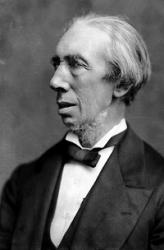
1813 - 1887 Meter: 8.8.6.8.8.6 Composer of "ADORATION (Macfarren)" George Alexander Macfarren, Mus. Doc.; b. London, 1813; d. London, 1887
Evangelical Lutheran Hymnal, 1908
=======================
Born: March 2, 1813, Westminster, England.
Died: October 31, 1887, St. Marylebone, England.
Buried: Hampstead Cemetery, London, England.
Brother of Walter Macfarren, George was a principal of the Royal Academy of Music; professor at Cambridge University; conductor at Covent Garden, London; program note writer for the Philharmonic Society; and editor of Handel and Purcell. He wrote 18 operas, 13 oratorios and cantatas, 9 symphonies, and 162 songs. He went blind in 1860, and was knighted in 1883.
Sources:
Frost, p. 681
Lightwood, p. 189
Nutter, p. 460
http://www.hymntime.com/tch/bio/m/a/c/macfarren_ga.htm
===============================
http://en.wikipedia.org/wiki/George_Alexander_Macfarren
George A. Macfarren
Harriet Reynolds Krauth Spaeth
1845 - 1925 Person Name: Harriet Reynolds Krauth Meter: 8.8.6.8.8.6 Composer of "ST. SIMEON" Harriet Reynolds Krauth Spaeth [Harriet Krauth], 1845-1925
Born: September 21, 1845, Baltimore, Maryland.
Died: May 5, 1925, Philadelphia, Pennsylvania.
Buried: Mount Vernon Cemetery, Philadelphia, Pennsylvania.
Daughter of hymn translator Charles Krauth, Harriet attended the Girls’ School in Philadelphia, and lived independently as a writer. In 1880, she married Adolph Spaeth, pastor of St. Johannis Church in Philadelphia (and later president of the General Council of the Lutheran Church in America). She sang contralto, played the piano and organ, and for many years was the organist at St. Stephen’s Church in west Philadelphia. She provided hymn translations for The Church Book (1868), The Sunday School Hymnal (1901), and was responsible for the music edition of The Church Book (1872). Many of her essays were published in The Lutheran. When American Lutherans adopted the Common Service in 1888, she prepared an edition with notes for chanting the service. She worked zealously for the founding of the Krauth Memorial Library at the seminary in Philadelphia, and was active in the work of the Mary J. Drexel Home, the Lankenau Hospital, and the Lutheran Orphans’ Home in Germantown, Pennsylvania. Her works include:
The Deaconess and Her Works
Pictures from the Life of Hans Sachs
The Church Book with Music, 1893
Charles Porterfield Krauth: A Life (2 volumes, 1898 & 1909, with Adolph Spaeth, uncredited)
Life of Adolph Spaeth, 1916
© The Cyber Hymnal™ (www.hymntime.com/tch)
Harriet Reynolds Krauth Spaeth
Hugh Bourne
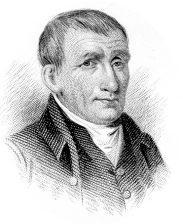
1772 - 1852 Meter: 8.8.6.8.8.6 Author of "The Lord's into his vineyard come, The blossoms yield a sweet perfume" Bourne, Hugh, the principal founder of the Primitive Methodist Society, and the editor of their first hymn-books, was born at Fordhays, Stoke-on-Trent, April 3, 1772. His father, Joseph Bourne, a person in humble circumstances, was a member of the Church of England, whilst his mother belonged to the Wesleyan Society. His education, for his circumstances, was fairly good; and by earnest application to study he acquired some knowledge of Hebrew, Greek, and Latin. His mind was of a strongly devotional cast, and the Methodist movement of those days had such attractions for him that he joined himself thereto in 1709. The following year he went to reside near the Mow Cop Colliery, near Burslem, where he had secured an engagement. There, with two or three men of kindred spirit, he carried on a system of Prayer Meetings which culminated in a great Camp Meeting, after the American fashion, upon the Mow Cop Mountain, on Sunday, May 31st, 1807. Other camp meetings followed, but were condemned by the Wesleyan Conference later in the same year. Hugh Bourne, however, continued his evangelistic work in connection with the Wesleyan Society until June 27, 1808, when he was excommunicated, without notice or trial, by the Quarterly Meeting held at Burslem on that day. Subsequent acts of coolness and indifference on the part of the Wesleyan authorities, together with continued success in his evangelistic work, led him gradually to organize the Primitive Methodist Connexion. The decisive break occurred in 1810. From that date to his death, on the 11th Oct., 1852, Bourne gave himself to the work of extending and building up the Society of which he was practically the founder. He was the first editor of its magazine, and the first to compile a hymnal for its use.
Hugh Bourne's first effort in hymnology was the published of a very small General Collection of Hymns and Spiritual Songs for Camp Meetings, Revivals, &c. 1809. This was enlarged and improved in 1819, 1820, 1821,1822, and again in 1824. To these editions he contributed 10 hymns. In 1829 a second collection was added by him to the foregoing, to which he contributed another 20 hymns. This is the Large Hymn Book, for the Use of the Primitive Methodists. From the first collection one hymn only is still retained in common use:—"Camp-meetings with success are crown'd,” altered to “Camp-meetings God has richly own'd," also rewritten by J. Flesher as, "This meeting with Thy presence crown," in the authorised hymnal of the Connexion; and from the second collection two hymns as follows:—
1. O Righteous Father, Lord of all. Prayer for Children.
2. We have a great High Priest. H. P. of Christ.
To the Large Hymn Book 146 hymns were also contributed which bore the signatures sometimes of "H. B. & W. S." and again "W. S. & H. B." In a note we are informed that the hymns with these ascriptions were by "Hugh Bourne and Wm. Sanders, jointly." Of these the following are at present in the authorized Primitive Methodist Hymn Book, 1853, and, in common with most of the hymns in that book, are greatly mutilated, and attributed now to Wm. Sanders and again to H. Bourne, without any apparent reason:—
1. A Pharisee unwisely stood. Lent.
2. Almighty God, of love divine. Praise.
3. Assist us, O Almighty Lord. Missions.
4. Come, let us lift our heart and voice. Christmas.
5. Come, with your sore diseases. Invitation.
6. Encouraged by Thy gracious word. Prayer.
7. Great Jehovah, Sovereign Lord. Prayer.
8. Hark, the Gospel news is sounding. Invitation.
9. Jesus, my Lord, was crucified. Passiontide.
10. Jesus, Who spilt His precious blood. The Advocate.
11. Led by the God of truth and grace. Seeking Heaven.
12. Light of the Gentile race. Missions.
13. My brethren in the Lord. Altered to— Ye foll'wers of the Lord. Faithfulness.
14. My soul is now united, &c. Altered to— By faith I am united. Union with Christ.
15. Now, Lord, I on Thy truth depend. Altered to— O Lord, I on Thy truth depend. Divine Aid.
16. Now, Lord, Thy blessing we implore. D. Blessing.
17. O, heavenly Zion, rise and shine. Altered to— Arise, O Zion, rise, &c. Missions.
18. See, in the mountain of the Lord. Missions.
19. Tho' in a world of sickness. Altered to— While in this world of sickness. Confidence.
20. To Thee, great Source of light. Confidence.
21. To Thee, O God of power divine. Goodness of God.
22. We now are journeying [going] to the place. Heavenward.
23. We read in Thy most holy word. Holy Baptism.
24. Ye sleeping souls, arise. Exhortation.
In addition to these, all of which are given in the official Collection of the Primitive Methodist Society, there is also:—
25. Welcome, 0 Saviour, to my heart. Prayer— which is well known to the American hymnals.
From a literary point of view these hymns are not worthy of the position which has been accorded to them for so many years. Their simplicity is their redeeming feature.
-- John Julian, Dictionary of Hymnology (1907)
===================
Bourne, Hugh, p. 165. ii., Nos. 14, "My soul is now united," and 19, "Tho' in a world of sickness," appeared in theSmall Hymn Book, 1821. Another hymn by Bourne and Sanders in the Primitive Methodist Hymnal, 1887, "Behold a sinner at Thy feet" (Penitence), is compiled from hymns 493 and 118 in the P. M. Large Hymn Book, 1824.
--John Julian, Dictionary of Hymnology, Appendix, Part II (1907)
Hugh Bourne
Moses Browne
1703 - 1787 Meter: 8.8.6.8.8.6 Author of "When With A Mind Devoutly Pressed" in The Cyber Hymnal Browne, Moses, was born in humble circumstances in 1703, and was distinguished as a poet and miscellaneous writer. He was Vicar of Olney, Bucks, and for some time Chaplain of Morden College, Blackheath, Kent, where he died Sept. 13, 1787. His poetical works were:—
(1) Poems, 1739; (2) The Works, and Rest of the Creation,in two parts. Pt. i. An Essay on the Universe; Pt. ii. Sunday Thoughts, &c, 1752 (6th edition, 1805). His hymns are contained in Pt. iv. of the Sunday Thoughts, together with versions of Ps. 130 and 139. He is known chiefly through his hymn "When with a mind devoutly pressed" (Penitence), which is "Night Song, No. viii.," in 5 stanzas of 4 lines, of the Sunday Thoughts, having originally appeared in his Poems, 1739, p. 457. He complains in a note of editors of hymn-books printing this hymn "from an imperfect copy." It has been ascribed from time to time to various authors. (3) He also published in 1772, a translation of J. L. Zimmerman's Excellency of the Knowledge of Jesus Christ, 1732, from which the hymn, "Tis not too hard, too high an aim," is taken. It is annotated under "Es ist nicht schwert."
-- John Julian, Dictionary of Hymnology (1907)
Moses Browne
Joseph Morris
Meter: 8.8.6.8.8.6 Translator of "Loss and Gain." in Favourite Welsh Hymns
Joseph Morris
Henry A. Lewis
Person Name: Henry Lewis, 1854- Meter: 8.8.6.8.8.6 Composer of "KINVER"
Henry A. Lewis
Cosmas, the Melodist
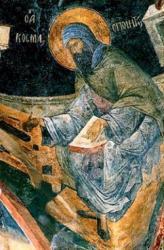
706 - 760 Person Name: St. Cosmas, died 760 A. D. Meter: 8.8.6.8.8.6 Author of "O Jesus, Lover of our race" in Hymns of the Greek Church Cosmas, St., The Melodist. (Died circ. A.D. 760.) The second among the Greek ecclesiastical poets. He was adopted by the father of St. John of Damascus, and educated with him by a Sicilian monk also named Cosmas, who had been redeemed from slavery by his adopted father. The two foster-brothers retired together to St. Sabas, and there stimulated, assisted and vied witii one another in the composition of hymns. It is not certain whether some of the Canons, Triodia, and Idiomela under the name of Cosmas may not be the work of the elder Cosmas. He was elected Bishop of Maiuma in A.D. 743, and is commemorated in the Greek Calendar on Oct. 14. The story of Cosmas the elder is beautifully told in Milman's Lat. Christ., vol. ii. 364. Daniel, vol. iii., gives 12 pieces by him, and Dr. Neale has translated in his Hymns of the Eastern Church, 1862, the Canon for Christmas Day, and a cento from that for the Transfiguration. To English readers he is known through the translation of this cento, "The choirs of ransom'd Israel," and its abbreviated form, "In days of old on Sinai." [Rev. H. Leigh Bennett, M.A.]
--John Julian, Dictionary of Hymnology (1907)
Cosmas, the Melodist
George F. LeJeune
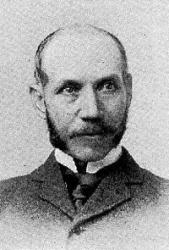
1841 - 1904 Meter: 8.8.6.8.8.6 Composer of "LAUS DEO (Le Jeune)" George Fitz-Curwood Le Jeune, 1841-1904
Born: June 18, 1841, London, England.
Died: April 11, 1904, Staten Island, New York.
Buried: Moravian Cemetery, Staten Island, New York.
Le Jeune studied music under Joseph Barnby and George Macfarren in London. In 1863, he moved to Montréal, Canada, where he continued his studies with George Carter. He later moved to America, playing the organ in churches in Hartford, Connecticut, and Philadelphia, Pennsylvania. He became the organist at St. John’s Chapel of Trinity Parish, New York City, in 1876, and also directed the choir there.
Sources:
Hughes, p. 471
--www.hymntime.com/tch
George F. LeJeune
Harriet M. Kimball
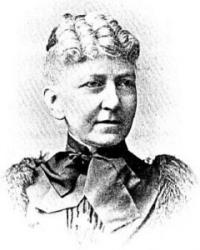
1834 - 1917 Meter: 8.8.6.8.8.6 Author of "Peace And Good Will" in The Cyber Hymnal Kimball, Harriet McEwan, a native and resident of Portsmouth, Newhaven, is the author of Hymns, Boston, 1866; Swallow Flights of Song, 1874, &c. Her hymns include:—
1. At times on Tabor's height. Faith and Joy
2. Dear Lord, to Thee alone. Lent.
3. It is an easy thing to say. Humble Service.
4. We have no tears Thou wilt not dry. Affliction. Appeared in the Poets of Portsmouth, 1864, and the Unitarian Hymns of the Spirit, 1864, and others. In Miss Kimball's Hymns, 1866, this hymn begins with stanza iii. of "Jesus the Ladder of my faith."
Several of Miss Kimball's poems were included in Baynes's Illustrated Book of Sacred Poems, 1867. [Rev. F. M. Bird, M.A.]
--John Julian, Dictionary of Hymnology (1907)
===================
Kimball, Harriet M., p. 624, ii., b. Nov. 2, 1834, and a Roman Catholic. From her hymn, "Jesus, the Ladder of my faith," p. 624, iii. 3, another cento, beginning "Sweeter to Jesus when on earth/* is taken. It is in The Pilgrim Hymnal, 1904.
--John Julian, Dictionary of Hymnology, New Supplement (1907)
Harriet M. Kimball
George Bradford Caird
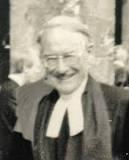
1917 - 1984 Person Name: George B. Caird, 1917-1984 Meter: 8.8.6.8.8.6 Author of "Not far beyond the sea, nor high" in The Hymnal 1982 George Bradford Caird (17 July 1917 – 21 April 1984), D.Phil., D.D., FBA, was a British churchman, theologian, humanitarian, and biblical scholar. At the time of his death he was Dean Ireland's Professor of the Exegesis of Holy Scripture at the University of Oxford.
Born in London, England to parents from Dundee, Scotland, George Caird's early years were spent in Birmingham, England, where his father was a construction engineer, and where he attended King Edward's School. His university education began at Peterhouse, Cambridge, where he received the B.A. in 1939, First-Class Honours in both parts of the Classical Tripos, with distinction in Greek and Latin verse. A lifelong Congregationalist, he then left Cambridge to study theology at Mansfield College, Oxford, and acquired the Oxford M.A., First-Class Honours, in 1943. In 1944 he was granted the Oxford D.Phil. for his thesis "The New Testament Conception of Doxa (Glory)".
After serving three years as a pastor in Highgate, London, in 1946 Caird and his young bride, Viola Mary Newport, known to all as "Mollie," pulled up stakes and left for Canada. Virtually fluent in ancient Hebrew, there he was quickly made Professor of Old Testament at St. Stephen's College, Edmonton, Alberta, and later (simultaneously) Professor of New Testament at McGill University and Principal of the United Theological College of Montreal.
In 1959 Caird returned to Oxford and the Congregationalist stronghold of Mansfield College, where he was first Senior Tutor (under John Marsh) and later Principal (1970–1977). Because he was non-Church of England, and because Mansfield was still a Permanent Private Hall and had not yet achieved status as a constituent College of the University (see Colleges of the University of Oxford) during this period (1969–1977), Caird was barred from holding an official university lectureship. However, as a compensation he was granted the honorary position of Reader (academic rank) in Biblical Studies, a status somewhere between Senior Lecturer and Professor. And whenever he lectured on the New Testament at Mansfield, students from all over the university came and filled the large lecture hall to capacity. According to Henry Chadwick, "He lectured as he preached, almost always without a note . . . with nothing before him but a Greek New Testament, usually upside down, for he knew the text by heart". In 1975-1976 Caird took on almost full-time administration, serving as Moderator of the United Reformed Church, and during his tenure he visited South Africa. His work in the fields of Old and New Testament (he remains one of the few modern biblical interpreters to have held chairs in both) led to four honorary doctorates (including the Oxford D.D.), election to the British Academy (and the granting of its Burkitt Medal for Biblical Studies), and appointment to be the Dean Ireland's Professor and Professorial Fellow at The Queen's College, Oxford.
In 1980 he won the Collins Religious Book Award for his work The Language and Imagery of the Bible. His final years involved biblical translation as a member of the translation panel of The Revised English Bible, as previously he had been a translator of The New English Bible's Apocrypha. He also co-edited (with Henry Chadwick ) Oxford's The Journal of Theological Studies from 1977-1984. In his lifetime he wrote nearly sixty articles, over a hundred book reviews, and six books. Following his resignation as Principal of Mansfield and his taking up of the Dean Ireland's chair, the Cairds left Oxford and moved into the sixteenth century thatched-roof "Brook Cottage" at Letcombe Regis, next to Wantage, Oxfordshire, seventeen miles southwest of Oxford. There they converted the cottage's back storeroom into "the Dusty" - a study for Caird to write in during his imminent retirement; it was there that he was working on his seventh major work, New Testament Theology, when he was felled by a heart attack on Easter Eve, 1984. His funeral was held in Mansfield College Chapel on 28 April, with Principal Donald Sykes delivering the eulogy; a memorial celebration was later conducted (13 October) in Great St. Mary's Church, Oxford, with his close friend Henry Chadwick delivering the address. A Festschrift was at the time in the works, which was subsequently converted into a memorial volume, The Glory of Christ in the New Testament: Studies in Christology in Memory of George Bradford Caird, edited by two of his students, Lincoln Hurst (L. D. Hurst) and Tom Wright (N. T. Wright), and published by Oxford University Press in late 1987. Shortly after his death, some quick decisions needed to be made, particularly that involving his half-completed New Testament Theology; accordingly, Hurst was appointed Caird's Literary Executor. In addition, his children (see below) set up a foundation, The G. B. Caird Memorial Trust, the proceeds from which might enable (successfully, as it turned out) a new senior position to be set up in his name at Mansfield College: the G. B. Caird Fellow in New Testament Theology. It is currently occupied by Dr. John Muddiman. Caird's academic legacy is also seen in that during the course of his career he taught numerous people who went on to garner serious scholarly attention. These include Marcus Borg, Colin Gunton, Lincoln Hurst, David P. Moessner, John Muddiman, Allison Trites, Francis Watson, and N. T. Wright. According to British Old Testament scholar James Barr, Caird was sometimes "practically adored" by students.
While to some Caird could appear austere, even intimidating, "he was in fact full of fun and humour". In his leisure time he enjoyed (most famously) bird-watching, croquet, snooker, music, theatre, reading mysteries, ping pong, chess, and all forms of puzzles — especially the crossword and jigsaw variety. Music in particular occupied his time: it "was important to him, and he wrote several hymns, some of which were included within standard hymnals such as Congregational Praise and Hymns Ancient and Modern". He and Mollie had four children: James, Margaret (Meg) Laing, John, and George (Geordie). To Caird the home was never just a house: it was a bastion of the family - a center of games, poetry, music, and other cultural activity, where he was, according to Henry Chadwick, "sublimely happy . . . it was a microcosm of vigorous debate and breathtaking wit, sparkling with his wife and his three sons and his daughter, whose gifts were a source of deep joy for him. From Mollie he caught his love for bird-watching, and from his children he loved to learn about architecture [James], drama [John], music [Geordie], and medieval philology [Meg]". Also, "no picture of George would be right which omitted his intense affection for his grandchildren."
--en.wikipedia.org/wiki/ (excerpts)
George Bradford Caird
Johann Gottfried Schicht

1753 - 1823 Person Name: J. G. Schicht (1753-1823) Meter: 8.8.6.8.8.6 Composer (Melody, and most of the harmony) of "MANNA" in Hymns for Celebration Johann Gottfried Schicht
Born: September 29, 1753 - Reichenau, Zittau, Germany
Died: February 16, 1823 - Leipzig, Germany
Johann Gottfried Schicht
James Merrick
1720 - 1769 Meter: 8.8.6.8.8.6 Author of "All glory to the eternal Three! Thee, Father, thee, O Son, and thee" Merrick, James , M.A., was born in 1720, and educated at Oxford, where he became a Fellow of Trinity College. He entered Holy Orders, but his health would not admit of parish work. He died at Reading, 1769. His publications include:—
(1) Messiah, a Divine Essay. Humbly dedicated to the Reverend the Vice-Chancellor of the University of Oxford and the Visitors of the Free School in Reading. By James Merrick, Ætat. 14, Senior Scholar of the School at their last Terminal Visitation, the 7th of October, 1734. Reading. (2) The Destruction of Troy. Translated from the Greek of Tryphiodorus into English Verse, with Notes, &c. 1742. (3) Poems on Sacred Subjects. Oxford . 1763. (4) The Psalms of David Translated or Paraphrased in English Verse. By James Merrick, M.A., late Fellow of Trinity College, Oxford. Reading. J. Carnan and Co. 1765. 2nd ed. 1766. A few only of these paraphrases were divided into stanzas. In 1797 the Rev. W. D. Tattersall pulished the work "Divided into stanzas for Parochial Use, and paraphrased in such language as will be intelligible to every capacity . . . with a suitable Collect to each Psalm from the Works of Archbishop Parker."
Merrick's paraphrases, although weak and verbose, were in extensive use in the early part of the present century, both in the Church of England and with Nonconformists. They have, however, fallen very much into disuse. Those in modern hymn-books, mainly in the form of centos, include:—
1. Blest Instructor, from Thy ways. Ps. xix.
2. Descend, O Lord! from heaven descend. Ps. cxliv. (In time of National Peril.)
3. Far as creation's bounds extend. Ps. cxlv.
4. God of my strength, the wise, the just. Ps. xxxi.
5. He who with generous pity glows. Ps. xli.
6. How pleasant, Lord.Thy dwellings are. Ps. lxxxiv.
7. Lift up your voice and thankful sing. Ps. cxxxvi.
8. Lo, my Shepherd's hand divine. Ps. xxiii.
9. Lord, my Strength, to Thee I pray. Ps. xxviii.
10. My heart its noblest theme has found. Ps.xlv.
11. O let me, [gracious] heavenly Lord extend. Ps. xxxix.
12. O turn, great Ruler of the skies. Ps. li.
13. Praise, O praise the Name divine. Ps. cl.
14. Sing, ye sons of [men] might, O sing. Ps. xxix.
15. Teach me, O teach me, Lord, Thy way. Ps. cxix.
16. The festal morn, my [O] God, is come. Ps. cxxii, (Sunday Morning.)
17. The morn and eve Thy praise resound. Ps. lxv. (Harvest.)
18. To Thy pastures, fair and large. Ps. xxiii.
From his Poems on Sacred Subjects, 1763, the following centos have also come into common use: --
19. Author of good, to Thee we turn. Resignation.
20. Eternal God, we look to Thee. Resignation.
21. 'Tis enough, the hour is come. Nunc Dimittis.
John Julian, Dictionary of Hymnology (1907)
James Merrick
Laurie F. Gauger
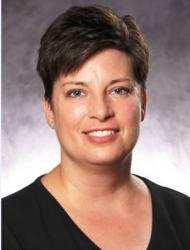
Person Name: Laurie F. Gauger, b. 1965 Meter: 8.8.6.8.8.6 Author of "O Lord of Nations" in Christian Worship Laurie Gauger has written and published hymns, devotions, religious curriculum materials, and hundreds of magazine articles. She has worked as an English and music teacher at Shoreland Lutheran High School (Somers, Wisconsin) and a curriculum writer and editor at Northwestern Publishing House (Milwaukee, Wisconsin). She currently serves Martin Luther College (New Ulm, Minnesota) as the campus writer/editor, producing two magazines, several newsletters, and various other publications. Her hymns have been published by Northwestern Publishing House, Concordia Publishing House, and Faith Alive. She can be reached at gaugerlf at mlc-wels.edu.
Laurie Gauger
Laurie F. Gauger
James P. Carrell
1787 - 1854 Meter: 8.8.6.8.8.6 Composer of "WANTAGE (Carrell)" James P. Carrell was a "farmer, Methodist minister, and county clerk in Lebanon, Russell County, Virginia. He was author of the Songs of Zion (1821) and co-author of Virginia Harmony (1831)" (Steel and Hulan 2010). Several of his songs were printed in Kentucky Harmony and its supplements.
James P. Carrell
Edward Patrick Crawford
1846 - 1912 Person Name: Edward Patrick Crawford, 1846-1912 Meter: 8.8.6.8.8.6 Composer of "JEHOVAH NISSI" in The Book of Praise
Edward Patrick Crawford
Joshua Drake
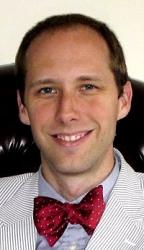
b. 1979 Person Name: Joshua F. Drake Meter: 8.8.6.8.8.6 Author of "O Christian Home" Born: September 27, 1979, Nashville, Tennessee.
Drake grew up on 40 acres of land that had been in his family for three generations. While studying Sacred Music at Union University in Jackson, Tennessee, he became interested in sustaining the church’s hymnody, and developed a love for poetry. In 2001, he went to pursue postgraduate studies in Musicology at the University of Glasgow, Scotland, where he graduated with a M.Mus. in 2003. As of 2006, he was pursuing his Ph.D. on late 15th Century Latin motets. He teaches Humanities and Music Theory at Grove City College, Pennsylvania, and worships at the Rocky Springs Presbyterian Church in Harrisville.
--www.hymntime.com/tch
Joshua Drake
H. D. Rawnsley
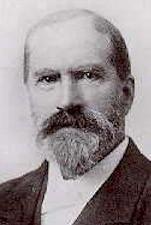
1851 - 1920 Person Name: Hardwicke D. Rawnsley Meter: 8.8.6.8.8.6 Author of "Lord Jesu, Who at Lazarus' Tomb" in The Cyber Hymnal Rawnsley, Hardwicke Drummond, M.A., son of the Rev. R. D. B. Rawnsley, M.A., sometime Prebendary of Lincoln, was born at Shiplake-on-Thames, Sept. 28,1850, and educated at Ball. Coll., Oxford, B.A. 1875, M.A. 1883; D. 1875, P. 1877; Curate of St. Barnabas, Bristol, 1875-77; Vicar of Low Wray, Lancashire, 1878-83, and Vicar of Crosthwaite since 1883. He became Rural Dean of Keswick 1883, Hon. Canon of Carlisle 1893, and Proctor in Convocation 1905. His publications include: Notes for the Nile, 1892; Literary Associations of the English Lakes, 1894; Memoir of Harvey Goodwin, Bishop of Carlisle, 1896; Sermons on the Logia, 1897, and various books of Poems and Sonnets. The best-known of his hymns are:—
1. Hark! I hear the trumpet sounding. [Mission Hymn for Children.] In the Ch. Missionary Hymn Book, 1899.
2. Lord God, our praise we give. [In Praise of Nature]. Contributed to the 1904 ed. of Hymns Ancient & Modern.
3. Now trumpets cease your sound. [Peace.] In Hymns of the Kingdom . . . for the use of the Christian Democracy. Norwich, 1903.
4. Saviour, Who didst healing give. [St. Luke.] Written at Crosthwaite Vicarage, Dec. 1, 1905, and included in The English Hymnal 1906.
5. Lord Jesu, Who at Lazarus' tomb. [Memorial of the Dead.] Written at Crosthwaite Vicarage, Dec. 2, 1905, for The English Hymnal, 1906.
6. Lord, Who gavest streams and fountains. [For a Dual School.] Written in 1898 at Keswick for the Holiday Association of the Home Readers' Union, and included in the Keswick School Hymn Book.
--John Julian, Dictionary of Hymnology, New Supplement (1907)
H. D. Rawnsley


 My Starred Hymns
My Starred Hymns


